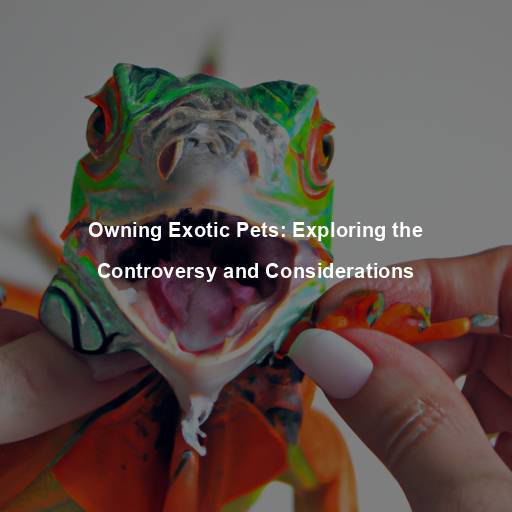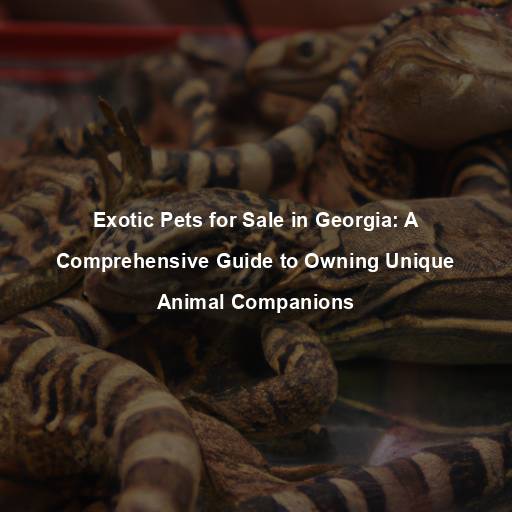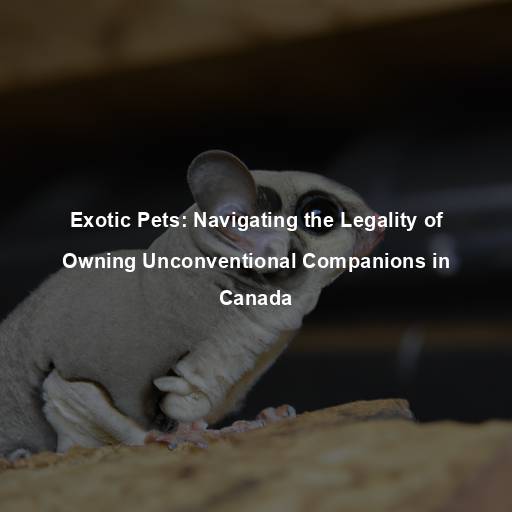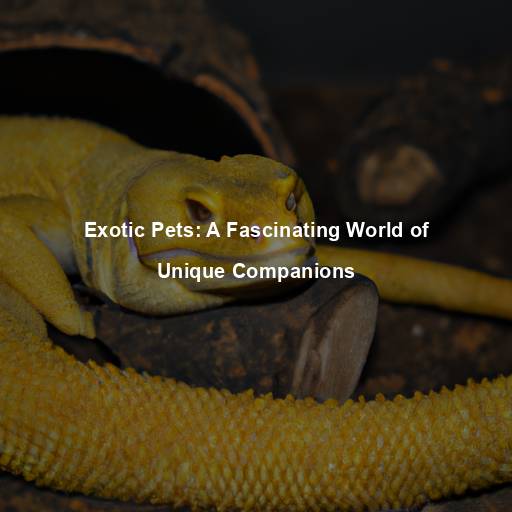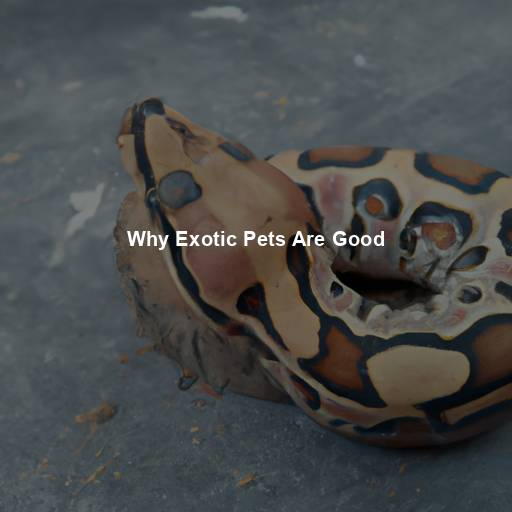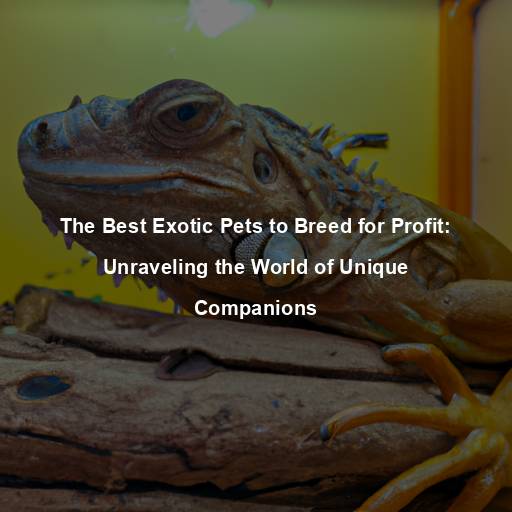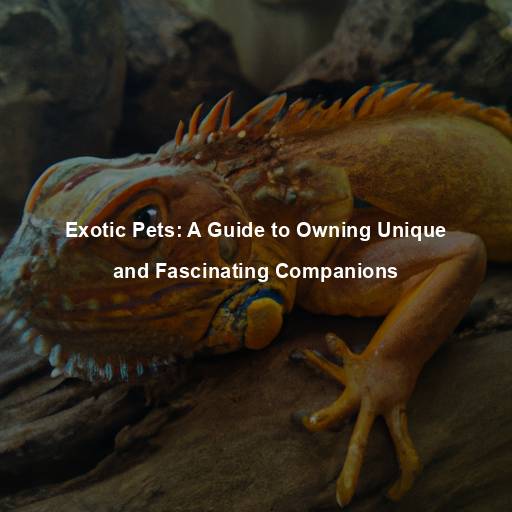Owning Exotic Pets: Exploring the Controversy and Considerations
Last Updated on July 21, 2023 by Evan
Contents
- 1 The Fascination with Exotic Pets
- 1.1 The Allure of the Unusual
- 1.2 The Challenges of Exotic Pet Ownership
- 1.3 The Impact on Conservation Efforts
- 1.4 The Dangers of Exotic Pets
- 1.5 Responsible Exotic Pet Ownership
- 1.6 The Controversial Debate
- 1.7 The Illegal Wildlife Trade
- 1.8 Ethical Considerations and Animal Welfare
- 1.9 Conservation and Education
- 1.10 The Importance of Education and Regulation
- 1.11 The Human Responsibility
- 1.12 A Balanced Perspective
- 2 FAQs: Is Owning Exotic Pets Bad?
- 2.1 Q: What are exotic pets?
- 2.2 Q: Is owning exotic pets bad for the animals?
- 2.3 Q: How does owning exotic pets impact conservation efforts?
- 2.4 Q: Do exotic pets pose risks to human safety?
- 2.5 Q: Are there alternatives to owning exotic pets?
- 2.6 Q: What can be done to ensure the welfare of exotic pets?
The Fascination with Exotic Pets
There’s no denying the timeless appeal of having a furry friend to cuddle up with at the end of a long day. But for those brave souls seeking a more unconventional bond, exotic pets are the name of the game. From slithering snakes to squawking parrots, the allure of these rare creatures is undeniable. Yet, as with any extraordinary endeavor, the question looms: is it wise to bring these enchanting beings into our homes?
The Allure of the Unusual
There is an undeniable allure to exotic pets that draws people in. These fascinating creatures possess an aura of mystique and intrigue, setting them apart from the run-of-the-mill domesticated animals we’re used to. From the breathtaking hues of tropical birds to the mesmerizing patterns of exotic reptiles, and even the sheer elegance of unconventional mammal species, the sheer beauty and fascination that exotics possess is simply captivating. It’s no wonder why people are irresistibly drawn to these unique and enchanting creatures.
The Challenges of Exotic Pet Ownership
While the allure of exotic pets is undeniable, it is essential to recognize the challenges that come with their ownership. These challenges extend beyond the basic care and attention required for any pet. Here are a few key considerations:
Legal Restrictions and Permits
Thinking about getting a unique and fascinating creature as a pet? Well, hold your horses! Before embarking on this extraordinary journey, it’s imperative to dive deep into the labyrinth of legalities that govern the ownership of exotic animals. Different jurisdictions have their own perplexing set of rules and regulations, demanding permits and compliance for these enigmatic creatures.
Specialized Care and Expertise
Exotic pets often have unique dietary, environmental, and behavioral needs that differ significantly from those of traditional pets. Properly caring for an exotic animal requires specialized knowledge and expertise. It is crucial to educate oneself extensively on the specific requirements of the chosen species and ensure that adequate resources are available to meet their needs.
Ethical Concerns
The ethical considerations of owning exotic pets are complex. Many exotic animals are obtained through illegal wildlife trade or taken from their natural habitats. This practice not only contributes to the decline of wild populations but also often involves cruel and unsustainable methods. Supporting this trade perpetuates the exploitation of these animals and threatens their survival in the wild.
The Impact on Conservation Efforts
When contemplating the ownership of exotic pets, it is crucial to delve into the far-reaching effects on conservation. These magnificent creatures often find themselves teetering on the brink of extinction or facing immense peril in their native habitats. The act of plucking them away from their natural homes only serves to further deteriorate their already fragile existence. In order to truly aid these species and promote their survival, we must wholeheartedly embrace initiatives dedicated to conservation and the careful, mindful breeding of these extraordinary animals.
The Dangers of Exotic Pets
It is paramount to recognize the multifaceted nature of owning an exotic pet, as it brings forth a labyrinth of risks that intertwine the well-being of owners and the broader community. These perils emanate from the innate characteristics of these extraordinary creatures, as well as the formidable hurdles they present. Within this enigmatic realm, an array of potential hazards looms, encompassing a plethora of concerns worth contemplating:
Health Risks
Exotic animals, such as reptiles, can carry zoonotic diseases that can be transmitted to humans. These diseases may be challenging to diagnose and treat, posing a risk to both owners and public health. Additionally, some exotic pets may have specific dietary needs that can be challenging to meet, potentially leading to nutritional deficiencies or other health issues.
Behavioral Challenges
As we welcome the allure of exotic animals into our homes, it’s crucial to acknowledge the perplexing reality that they have evolved in vastly different environments. This divergence poses a burstiness of behavioral challenges that can ignite stress, aggression, and a multitude of other issues. In order to bridge this gap and create a harmonious domesticated setting, extensive training and socialization become inevitable, demanding our time and dedication.
Public Safety Concerns
Exotic pets, especially larger or more dangerous species, can pose a significant risk to public safety. Escapes or mishandling incidents can result in injuries or even fatalities. The potential for harm to individuals and ecosystems should not be taken lightly when considering the ownership of exotic pets.
Responsible Exotic Pet Ownership
Considering an exotic pet? As intriguing as it may be, tread with caution! Though certainly not the best choice for everyone, responsible ownership can help navigate the labyrinth of challenges and risks that come hand in hand with these extraordinary creatures. If you find yourself contemplating the path of a proud exotic pet parent, here are some indispensable guidelines to help steer you through the perplexing journey ahead.
Thorough Research and Education
Embarking on an extraordinary journey with an exotic pet requires a diligent, exploratory approach. Dive deep into the intricate world of research, feeding your mind with knowledge about their unique needs, quirky behaviors, and potential hurdles. Unlock wisdom from the vaults of esteemed experts and reputable organizations devoted to the intricate care of these fascinating creatures.
Adoption and Rescue
Consider adopting from reputable rescue organizations instead of purchasing from the illegal wildlife trade. Many exotic animals end up in rescue centers due to improper care, abandonment, or confiscation. By adopting, you can provide a loving home for an animal in need while avoiding the support of unethical practices.
Adequate Space and Enrichment
Aspiring pet owners take note: exotic animals bring a whole new level of complexity and intrigue. These captivating creatures demand ample space and bespoke ecosystems, setting them apart from your run-of-the-mill pets. To keep them content and thriving, it’s crucial to deck out their habitats with everything they need to satisfy their physical and emotional cravings. From brain-stimulating toys to species-specific training, these flavorful additions ensure their mental well-being remains intact.
Regular Veterinary Care
When it comes to exotic animals, ensuring their overall health and happiness is as crucial as with any other furry companion. To guarantee their well-being, seeking the expertise of a specialized veterinarian who understands the intricate needs of these unique pets becomes essential. By entrusting the medical advice and preventive healthcare of your exotic pet to an experienced veterinarian, you can embrace the joy of having an extraordinary animal friend while prioritizing their perplexing health requirements.
The Controversial Debate
The controversy surrounding exotic pet ownership continues to ignite fiery discussions, leaving us deeply perplexed. Is it truly a moral abyss or is there a sliver of hope amidst this chaotic tapestry? While the treacherous path of exotic pet ownership can be laden with valid concerns and potential pitfalls, a glimmer of enlightenment manages to burst through the dense fog. Responsible guardianship, fraught with the delicate balance of education and conservation, can provide a remarkably rare window into the wonders of the animal kingdom.
The Illegal Wildlife Trade
When diving into the captivating realm of exotic pets, it becomes glaringly apparent that there is a shadowy underbelly lurking behind the scenes. The insatiable desire for rare and unconventional creatures is like a hurricane, fueling an illicit market that thrives on the anguish and torment of our precious wildlife. Through heart-wrenching means, these extraordinary beings are snatched from their natural habitats, robbed of their freedom and subjected to unspeakable cruelty. The consequences of this clandestine trade ripple far beyond the survival of countless species, casting a dark shadow on our environment and perpetuating the ominous spread of diseases.
Ethical Considerations and Animal Welfare
The ethical implications of owning exotic pets extend beyond the issue of illegal trade. Even when obtained legally, questions arise concerning the welfare and well-being of these animals in captivity. Many exotic species have complex behavioral and physiological needs that are challenging to meet in a domestic setting. The confinement and limited environments often lead to stress, physical ailments, and behavioral issues.
It is essential to recognize that wild animals are adapted to their natural habitats, where they can roam freely and engage in instinctual behaviors. Confining them to cages or enclosures can have detrimental effects on their overall health and quality of life. While some exotic pets may adapt to captive conditions, it is crucial to ensure that their needs are met and that their welfare is a top priority.
Conservation and Education
Despite the concerns and controversies surrounding exotic pet ownership, there are instances where responsible ownership can contribute to conservation efforts and educational initiatives. Zoos, sanctuaries, and educational institutions play a crucial role in raising awareness about endangered species and the importance of their conservation. These institutions often have specialized facilities, resources, and expertise to provide appropriate care for exotic animals while contributing to scientific research and public education.
Responsible exotic pet owners can also play a role in conservation by supporting breeding programs that prioritize genetic diversity and the preservation of endangered species. Ethical breeders focus on maintaining healthy populations and avoiding the negative impacts associated with capturing animals from the wild.
The Importance of Education and Regulation
In a world filled with compelling debates and lingering uncertainties, one topic that remains ensnared in a web of controversy is none other than the ownership of exotic pets. A kaleidoscope of perspectives dances through the forefront of this discourse, but amongst the fervent chaos, education and awareness emerge as the guiding lights that can pave the way towards clarity. Armed with the power of knowledge, individuals can traverse the labyrinthine paths of choice with confidence, meticulously weighing the suitability of opening their hearts and homes to these extraordinary creatures. It is only through a deep understanding of the intricacies of each unique species that we can safeguard the wellbeing of these captivating beings, while simultaneously safeguarding the harmony and safety of our shared community.
Ensuring the safekeeping of exotic animals requires an intricate balance between regulation and enforcement. By fortifying regulations, we can forge a shield against the adverse repercussions of the exotic pet trade, thwart the transmission of zoonotic diseases, and safeguard the well-being of both animals and society. Tackling this multifaceted issue demands a collaborative effort, with authorities collaborating alongside animal welfare organizations, conservation groups, and specialists to fashion and execute impactful regulations that foster conscientious exotic pet ownership.
The Human Responsibility
Ultimately, the decision to own an exotic pet rests on individual responsibility. It is vital to assess one’s ability to provide the necessary care, resources, and environment for the specific needs of the animal. The welfare and well-being of the animal should always take precedence over personal desires or fascination.
Thinking about bringing an exotic pet into your life? Take a moment to ponder your true motivations and expectations. It’s important to ask yourself if you’re genuinely ready for the myriad challenges and responsibilities that accompany owning such a unique creature. Can you truly provide the ideal setting, nourishment, and mental stimulation required for the particular species that has caught your fancy?
A Balanced Perspective
The intriguing discourse regarding the ownership of exotic pets is a mind-boggling tapestry of multifaceted viewpoints. Delving into this whirlwind of perspectives, one encounters a vivid spectrum of valid arguments that defy easy categorization. On one hand, we must grapple with the daunting litany of risks, challenges, and moral quandaries entangled in the tapestry of exotic pet ownership. Conversely, it is imperative to embrace the glimmering possibility that responsible guardianship of these extraordinary creatures could yield profound contributions to the realms of conservation and education.
A balanced perspective considers the welfare of the animals, the preservation of their natural habitats, and the education and awareness of the public. By striving for responsible ownership, supporting conservation efforts, and promoting ethical practices, we can navigate the controversies and complexities surrounding exotic pet ownership while ensuring the well-being of these extraordinary creatures.
FAQs: Is Owning Exotic Pets Bad?
Q: What are exotic pets?
A: Exotic pets refer to animals that are typically not found in the usual range of domesticated animals. These pets could include various species such as reptiles (e.g., snakes and lizards), amphibians (e.g., frogs and turtles), birds (e.g., parrots and macaws), mammals (e.g., monkeys and sugar gliders), and even some insects or arachnids.
Q: Is owning exotic pets bad for the animals?
B: The allure of owning exotic pets is undeniably tempting, but it’s a realm plastered with perplexing questions and shadowed by concerns for animal welfare. Delving into this territory unveils a tangled tapestry of complex needs, as these animals require an intricate dance of replicating their natural habitats, ensuring adequate nutrition, and fulfilling their behavioral requirements. The jigsaw puzzle of responsible ownership proves to test even the most well-intentioned, with the lack of necessary knowledge and resources casting a looming cloud over the potential well-being of these extraordinary creatures.
Q: How does owning exotic pets impact conservation efforts?
A: The ownership of certain exotic pets can have negative implications for conservation efforts. Many of these animals are sourced from the wild, leading to potential harm to their natural populations and ecosystems. Furthermore, exotic pets that are no longer wanted or become too challenging to care for are often released into non-native habitats, which can disrupt and damage local ecosystems when they outcompete native species or introduce diseases. Supporting responsible conservation efforts and discouraging the trade of exotic pets can help protect wild populations and their habitats.
Q: Do exotic pets pose risks to human safety?
Keeping exotic pets can indeed present certain challenges and concerns. The unpredictability of their natural instincts and behaviors can sometimes put human safety at risk. In addition, these animals may carry zoonotic diseases or display aggressive tendencies, posing potential dangers. Furthermore, their size and strength may exceed initial expectations, and there have been cases of these pets harming their owners or causing public safety issues by escaping. Therefore, it is crucial to prioritize the well-being of both owners and the general public when contemplating the ownership of exotic pets.
Q: Are there alternatives to owning exotic pets?
B: Oh, yes, indeed! If you are someone who truly revels in the allure of extraordinary and captivating creatures, fret not, for there exists a plethora of options that do not involve the controversial realm of owning exotic pets. Immerse yourself in the wonders of nature by exploring nature reserves, wildlife sanctuaries, or zoological parks that not only provide a wealth of knowledge but also interactive encounters that satiate your thirst for the extraordinary. Furthermore, have you considered the possibility of embracing the charm of local domesticated species as your delightful companions, eschewing the ethical and practical quandaries entangled with exotic pets? Remember, always choose a pet that harmonizes impeccably with your lifestyle and ensure that you are committed to fulfilling their needs conscientiously.
Q: What can be done to ensure the welfare of exotic pets?
A: To ensure the welfare of exotic pets, it is crucial to research extensively before adopting or purchasing any exotic animal. Understand the specific needs of the species you are considering, including housing requirements, diet, socialization needs, and any legal regulations associated with their ownership. Seek advice from reputable exotic animal veterinarians, specialists, or organizations knowledgeable in their care. Additionally, supporting legislation that enforces stricter regulations for owning and trading exotic pets, including mandatory permits and education requirements, can help improve the welfare of these animals.

